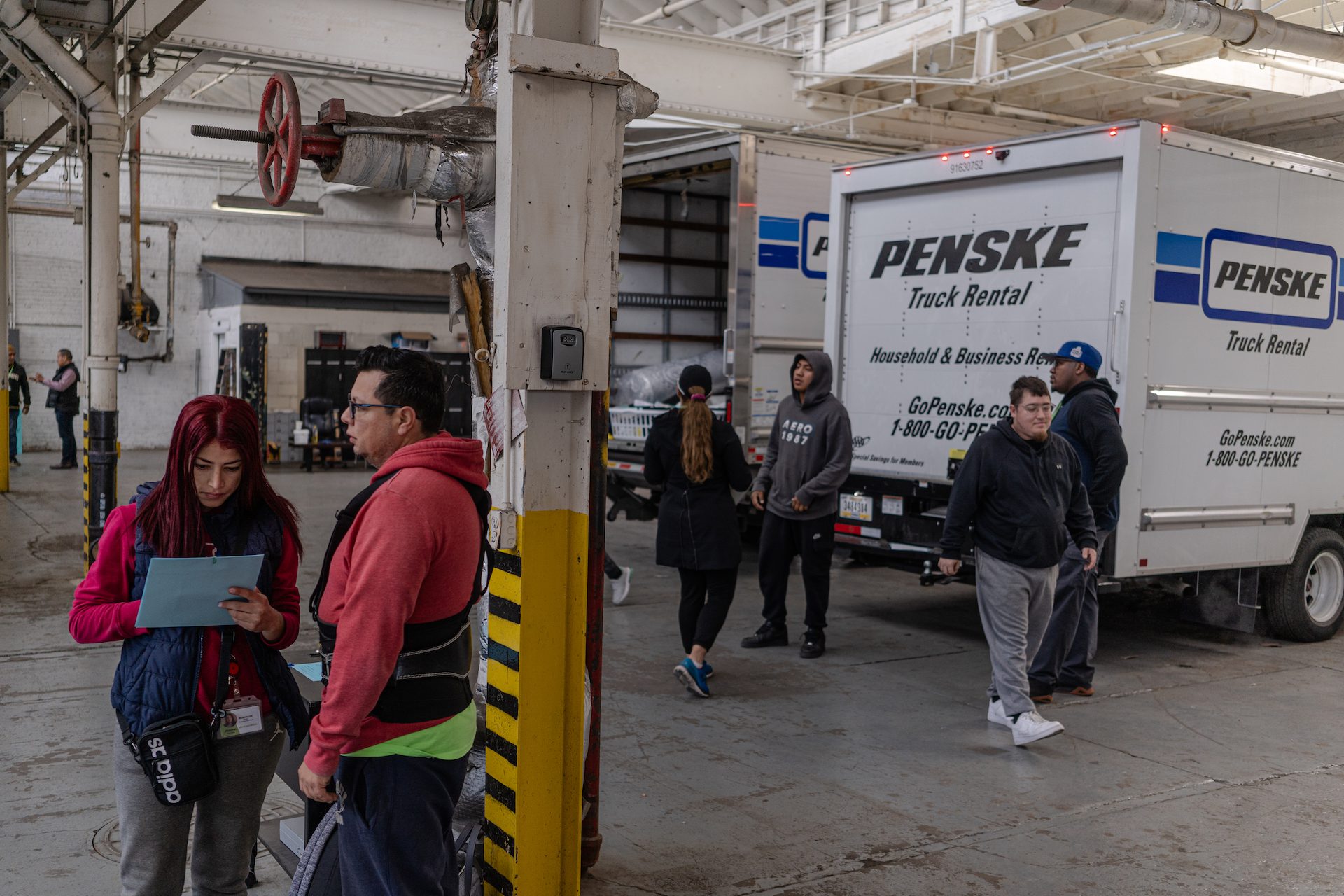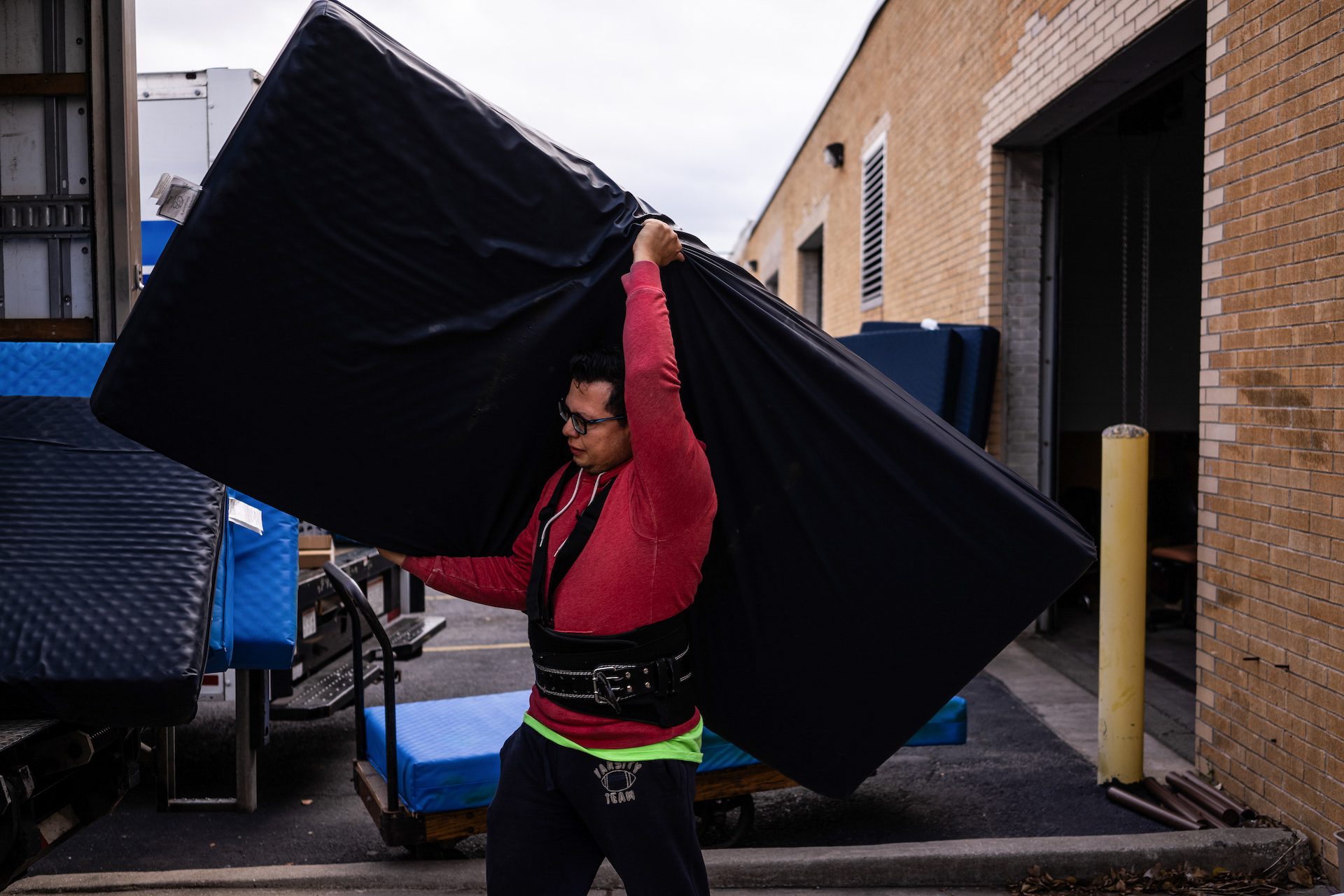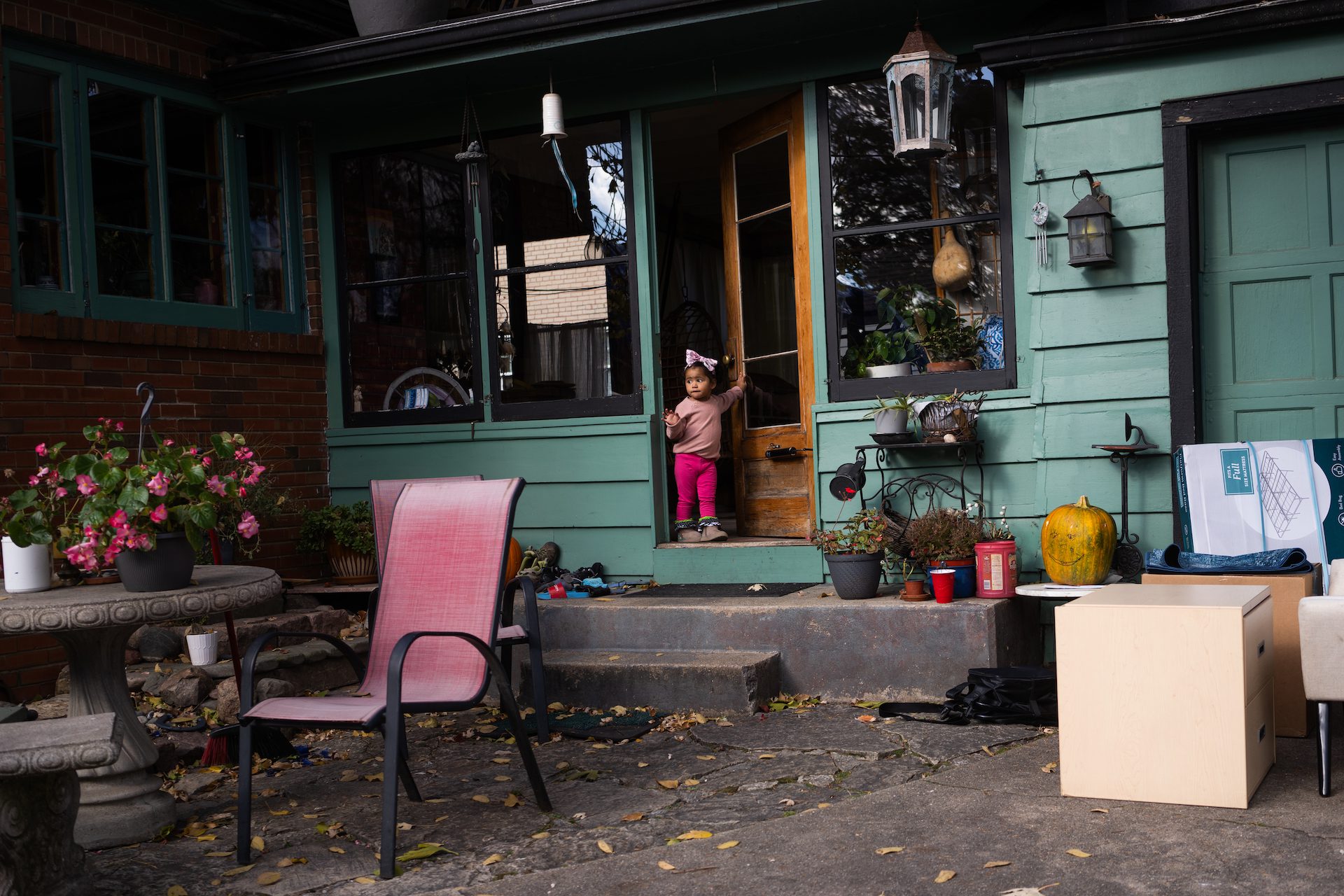 Sebastián Hidalgo para Borderless Magazine
Sebastián Hidalgo para Borderless MagazineEl programa New Vecino de New Life Centers, financiado por el Estado, proporciona a los solicitantes de asilo servicios integrales y mobiliario para sus nuevos apartamentos.
Jorge Crespo encuentra un lugar para un juego de dormitorio recién donado dentro de su apartamento con su mujer y su hija adolescente en University Park, en los suburbios del sur.
Su apartamento, asegurado hace apenas unos días, está escondido en un pasillo rodeado de casas adosadas, un aparcamiento y hectáreas de extensos campos a unas 36 millas de Chicago.
El hogar es un refugio bienvenido tras meses de incertidumbre.
Noticias que ponen el poder en el punto de mira y a las comunidades en el centro.
Suscríbase a nuestro boletín gratuito y reciba actualizaciones dos veces por semana.
Los Crespo emigraron a través de la selva panameña, atravesaron ríos traicioneros y cruzaron la frontera estadounidense en busca de asilo. Tras ser trasladados en autobús de Texas a Chicago, pasaron meses durmiendo en tiendas de campaña frente a comisarías de policía y en un refugio municipal. Por primera vez desde que salieron de Venezuela, los Crespo sienten que por fin han encontrado una vivienda estable.
"Aquí se está mejor", dijo, señalando que su hija mayor, que vive en Nueva York, había no ha recibido el mismo apoyo por parte de las autoridades locales.t.
Crespo y su familia son algunos de los cientos de solicitantes de asilo que han recibido muebles para sus nuevos apartamentos como parte del programa de ayuda a los solicitantes de asilo. Programa Nuevos Vecinos de New Life Centersuna iniciativa financiada por el Estado para ayudar en los esfuerzos de reasentamiento de inmigrantes.
Desde mayo, esta organización religiosa de Chicago se dedica a proporcionar muebles a los emigrantes una vez que son aprobados por la Programa de Ayuda de Emergencia al Alquiler para Solicitantes de Asiloque ofrece ayuda al alquiler de tres meses para inmigrantes.
En los últimos siete meses, New Life Centers y el Chicago Funiture Bank han llenado de muebles unos 1.400 apartamentos desde que iniciaron esta labor en primavera. El grupo amuebla 125 nuevos hogares semanalmente, pero esperan que sus esfuerzos de entrega aumenten tras un cambio en la política de albergues de la ciudad.

El mes pasado, el alcalde Brandon Johnson anunciado Chicago limitaría a 60 días la estancia de los inmigrantes en los centros de acogida. El plan acelerado pretende sacar a los solicitantes de asilo de los distritos policiales y de los centros de acogida y hacer recaer en todos los niveles de gobierno la responsabilidad de poner a la gente a trabajar, dijo Johnson.
"Estamos aplicando un límite escalonado de 60 días de estancia en refugios, combinado con una sólida gestión de casos y acceso a la mano de obra para que los recién llegados avancen por nuestro sistema hacia la autosuficiencia y la estabilidad económica", declaró Johnson en una rueda de prensa.
Acerca de 13.100 solicitantes de asilo permanecen en albergues gestionados por la ciudad y más de 1.000 en el exterior de comisarías y en el aeropuerto internacional O'Hare, mientras que 8.326 personas y familias se reasentaron y 2.906 se reunieron con sus patrocinadores a finales de noviembre, según datos de la ciudad.
Andre Gordillo, director del programa Nuevos Vecinos de New Life Centers, dijo que la organización está contratando más asistentes sociales y personal de mudanzas para mantener el ritmo de los esfuerzos de reasentamiento.
La presión para que las familias consigan una vivienda pesa sobre los trabajadores de New Vecinos en New Life, dijo Gordillo, que cree que se puede hacer más para ayudar a las familias inmigrantes a reasentarse.
"Nadie tenía un manual sobre la mejor manera de afrontar esto", dijo Gordillo. "Tenemos un equipo de gente que quiere servir y ayudar".
A finales de noviembre, Jheyson Pulgarin Moncada y Sandra Milena Gallego, conductores de New Vecinos y encargados de la mudanza, cargan un camión con colchones, somieres de madera, almohadas, algunas cómodas, alfombras y algunos cuadros en el almacén del Chicago Funiture Bank, en la zona sur de Chicago. Conducen por toda la ciudad y los suburbios, llenando apartamentos y casas de muebles para solicitantes de asilo mientras reflexionan sobre lo que han visto como parte del esfuerzo.
"Es muy duro verlo, más cuando sus hijos están fuera de los albergues y ahora con el frío, los vemos, y digo: '¡Dios mío!". dijo Milena Gallego. "Hay gente que necesita lo básico para vivir una vida humana básica. Una buena forma de vida".
Los de la mudanza llegan a una casa de Morgan Park con jardín y amplio camino de entrada. Gallego lee el siguiente nombre de la lista: Marianny Yamileth Pérez Pérez.
Gallego y Moncada pasan los muebles por delante de Pérez, que vive en el sótano con su marido y sus dos hijas. Se sienta en el patio trasero a ver jugar a su hija de dos años mientras su marido, Héctor, ayuda a los de la mudanza a meter los muebles en la casa.

La familia Pérez lleva en la casa asignada en alquiler desde septiembre. Está agradecida por el apoyo que ha recibido su familia. Los nuevos muebles son la primera vez que se sienten dueños de algo.
El siguiente paso, dijo Pérez, es conseguir permisos de trabajo para vivir una vida mejor y mantener a sus padres ancianos en Venezuela.
Después de tanta incertidumbre, Pérez dice que la casa amueblada ofrece esperanza y seguridad. Le gratifica ver a su hija mayor volver del colegio para hacer los deberes todos los días. "Me dice: 'Mamá, ya no quiero mudarme".


